P1: OTE/OTE/SPH
FM
BLBK295-Teodorescu
P2: OTE
November 18, 2010
19:43
Printer Name: Yet to Come
GRID CONVERTERS FOR
PHOTOVOLTAIC AND
WIND POWER SYSTEMS
Grid Converters for Photovoltaic and Wind Power Systems Remus Teodorescu, Marco Liserre and Pedro Rodríguez
© 2011 John Wiley & Sons, Ltd. ISBN: 978-0-470-05751-3
�
P1: OTE/OTE/SPH
FM
BLBK295-Teodorescu
P2: OTE
November 18, 2010
19:43
Printer Name: Yet to Come
GRID CONVERTERS FOR
PHOTOVOLTAIC AND
WIND POWER SYSTEMS
Remus Teodorescu
Aalborg University, Denmark
Marco Liserre
Politecnico di Bari, Italy
Pedro Rodr´ıguez
Technical University of Catalonia, Spain
A John Wiley and Sons, Ltd., Publication
�
P1: OTE/OTE/SPH
FM
BLBK295-Teodorescu
P2: OTE
November 18, 2010
19:43
Printer Name: Yet to Come
This edition first published 2011
C 2011, John Wiley & Sons, Ltd
Registered office
John Wiley & Sons, Ltd, The Atrium, Southern Gate, Chichester, West Sussex, PO19 8SQ, United Kingdom
For details of our global editorial offices, for customer services and for information about how to apply for permission to
reuse the copyright material in this book please see our website at www.wiley.com.
The right of the author to be identified as the author of this work has been asserted in accordance with the Copyright,
Designs and Patents Act 1988.
All rights reserved. No part of this publication may be reproduced, stored in a retrieval system, or transmitted, in any form
or by any means, electronic, mechanical, photocopying, recording or otherwise, except as permitted by the UK Copyright,
Designs and Patents Act 1988, without the prior permission of the publisher.
Wiley also publishes its books in a variety of electronic formats. Some content that appears in print may not be available in
electronic books.
Designations used by companies to distinguish their products are often claimed as trademarks. All brand names and
product names used in this book are trade names, service marks, trademarks or registered trademarks of their respective
owners. The publisher is not associated with any product or vendor mentioned in this book. This publication is designed to
provide accurate and authoritative information in regard to the subject matter covered. It is sold on the understanding that
the publisher is not engaged in rendering professional services. If professional advice or other expert assistance is required,
the services of a competent professional should be sought.
MATLAB R
accuracy of the text or exercises in this book. This book’s use or discussion of MATLAB R
does not constitute endorsement or sponsorship by The MathWorks of a particular pedagogical approach or particular use
of MATLAB R
is a trademark of The MathWorks, Inc., and is used with permission. The MathWorks does not warrant the
software or related products
software.
Library of Congress Cataloguing-in-Publication Data
Teodorescu, Remus.
Grid converters for photovoltaic and wind power systems / Remus Teodorescu, Marco Liserre, Pedro Rodr´ıguez.
p. cm.
Includes bibliographical references and index.
ISBN 978-0-470-05751-3 (hardback)
1. Electric current converters.
systems–Equipment and supplies.
2. Photovoltaic power systems–Equipment and supplies.
I. Liserre, Marco.
II. Rodr´ıguez, Pedro.
III. Title.
TK7872.C8T46 2011
621.31
244–dc22
A catalogue record for this book is available from the British Library.
Print ISBN: 9780470057513
E-PDF ISBN: 9780470667040
O-book ISBN: 9780470667057
Set in in 10/12pt Times by Aptara Inc., New Delhi, India
3. Wind energy conversion
2010031106
�
P1: OTE/OTE/SPH
FM
BLBK295-Teodorescu
P2: OTE
November 12, 2010
13:29
Printer Name: Yet to Come
Contents
About the Authors
Preface
Acknowledgements
Introduction
1
1.1 Wind Power Development
1.2
1.3
Photovoltaic Power Development
The Grid Converter – The Key Element in Grid Integration
of WT and PV Systems
References
2
2.1
2.2
2.3
2.4
2.5
2.6
2.7
Basic Full-Bridge Inverter
H5 Inverter (SMA)
HERIC Inverter (Sunways)
REFU Inverter
Full-Bridge Inverter with DC Bypass – FB-DCBP (Ingeteam)
Full-Bridge Zero Voltage Rectifier – FB-ZVR
Summary of H-Bridge Derived Topologies
Photovoltaic Inverter Structures
Introduction
Inverter Structures Derived from H-Bridge Topology
2.2.1
2.2.2
2.2.3
2.2.4
2.2.5
2.2.6
2.2.7
Inverter Structures Derived from NPC Topology
2.3.1
2.3.2
2.3.3
Typical PV Inverter Structures
2.4.1
Neutral Point Clamped (NPC) Half-Bridge Inverter
Conergy NPC Inverter
Summary of NPC-Derived Inverter Topologies
H-Bridge Based Boosting PV Inverter with High-Frequency
Transformer
Three-Phase PV Inverters
Control Structures
Conclusions and Future Trends
References
xiii
xv
xvii
1
1
3
4
4
5
5
6
7
11
13
15
17
19
21
21
21
23
25
25
25
26
27
28
29
�
P1: OTE/OTE/SPH
FM
BLBK295-Teodorescu
P2: OTE
November 12, 2010
13:29
Printer Name: Yet to Come
vi
3
3.1
3.2
3.3
3.4
3.5
3.6
4
4.1
4.2
4.3
4.4
4.5
4.6
4.7
5
5.1
5.2
IEEE 1547 Interconnection of Distributed Generation
IEC 61727 Characteristics of Utility Interface
VDE 0126-1-1 Safety
IEC 61000 Electromagnetic Compatibility (EMC – low frequency)
EN 50160 Public Distribution Voltage Quality
Grid Requirements for PV
Introduction
International Regulations
3.2.1
3.2.2
3.2.3
3.2.4
3.2.5
Response to Abnormal Grid Conditions
3.3.1
3.3.2
3.3.3
Power Quality
3.4.1
3.4.2
3.4.3
Anti-islanding Requirements
3.5.1
3.5.2
3.5.3
Summary
References
Voltage Deviations
Frequency Deviations
Reconnection after Trip
DC Current Injection
Current Harmonics
Average Power Factor
AI Defined by IEEE 1547/UL 1741
AI Defined by IEC 62116
AI Defined by VDE 0126-1-1
PLL Based on a T/4 Transport Delay
PLL Based on the Hilbert Transform
PLL Based on the Inverse Park Transform
Grid Synchronization in Single-Phase Power Converters
Introduction
Grid Synchronization Techniques for Single-Phase Systems
Grid Synchronization Using the Fourier Analysis
4.2.1
4.2.2
Grid Synchronization Using a Phase-Locked Loop
Phase Detection Based on In-Quadrature Signals
Some PLLs Based on In-Quadrature Signal Generation
4.4.1
4.4.2
4.4.3
Some PLLs Based on Adaptive Filtering
4.5.1
4.5.2
4.5.3
4.5.4
The SOGI Frequency-Locked Loop
4.6.1
Analysis of the SOGI-FLL
Summary
References
The Enhanced PLL
Second-Order Adaptive Filter
Second-Order Generalized Integrator
The SOGI-PLL
Islanding Detection
Introduction
Nondetection Zone
Contents
31
31
32
32
33
33
34
34
35
35
36
36
37
37
37
38
38
39
40
40
41
41
43
43
44
45
51
58
63
63
64
65
68
70
72
74
78
80
82
89
89
93
93
94
�
P1: OTE/OTE/SPH
FM
BLBK295-Teodorescu
P2: OTE
November 12, 2010
13:29
Printer Name: Yet to Come
Contents
5.3
5.4
5.5
5.6
Overview of Islanding Detection Methods
Passive Islanding Detection Methods
OUF–OUV Detection
5.4.1
Phase Jump Detection (PJD)
5.4.2
Harmonic Detection (HD)
5.4.3
5.4.4
Passive Method Evaluation
Active Islanding Detection Methods
Frequency Drift Methods
5.5.1
Voltage Drift Methods
5.5.2
5.5.3
Grid Impedance Estimation
PLL-Based Islanding Detention
5.5.4
5.5.5
Comparison of Active Islanding Detection Methods
Summary
References
Grid Converter Structures for Wind Turbine Systems
Introduction
6
6.1
6.2 WTS Power Configurations
6.3
Grid Power Converter Topologies
6.3.1
6.3.2
Single-Cell (VSC or CSC)
Multicell (Interleaved or Cascaded)
6.4 WTS Control
6.5
7
7.1
7.2
7.3
7.4
7.5
Generator-Side Control
WTS Grid Control
6.4.1
6.4.2
Summary
References
Grid Requirements for WT Systems
Introduction
Grid Code Evolution
7.2.1
Denmark
Germany
7.2.2
Spain
7.2.3
UK
7.2.4
7.2.5
Ireland
US
7.2.6
China
7.2.7
7.2.8
Summary
Frequency and Voltage Deviation under Normal Operation
Active Power Control in Normal Operation
7.4.1
7.4.2
Reactive Power Control in Normal Operation
7.5.1
7.5.2
7.5.3
Power Curtailment
Frequency Control
Germany
Spain
Denmark
vii
96
98
98
99
99
103
104
104
110
110
114
119
121
121
123
123
124
128
128
133
135
136
139
142
142
145
145
146
148
148
149
149
150
150
150
151
151
152
153
154
155
155
157
157
�
P1: OTE/OTE/SPH
FM
BLBK295-Teodorescu
P2: OTE
November 12, 2010
13:29
Printer Name: Yet to Come
viii
7.6
7.7
7.8
7.9
8
8.1
8.2
8.3
8.4
8.5
8.6
9
9.1
9.2
9.3
UK
Ireland
US
Germany
Spain
US-WECC
7.5.4
7.5.5
7.5.6
Behaviour under Grid Disturbances
7.6.1
7.6.2
7.6.3
Discussion of Harmonization of Grid Codes
Future Trends
7.8.1
7.8.2
7.8.3
Summary
References
Local Voltage Control
Inertia Emulation (IE)
Power Oscillation Dumping (POD)
Unbalanced Grid Voltages during a Grid Fault
Transient Grid Faults, the Voltage Sags (Dips)
Propagation of Voltage Sags
Grid Synchronization in Three-Phase Power Converters
Introduction
The Three-Phase Voltage Vector under Grid Faults
8.2.1
8.2.2
8.2.3
The Synchronous Reference Frame PLL under Unbalanced and Distorted
Grid Conditions
The Decoupled Double Synchronous Reference
Frame PLL (DDSRF-PLL)
8.4.1
8.4.2
8.4.3
8.4.4
The Double Second-Order Generalized Integrator FLL (DSOGI-FLL)
8.5.1
8.5.2
8.5.3
8.5.4
Summary
References
Structure of the DSOGI
Relationship between the DSOGI and the DDSRF
The FLL for the DSOGI
Response of the DSOGI-FLL
The Double Synchronous Reference Frame
The Decoupling Network
Analysis of the DDSRF
Structure and Response of the DDSRF-PLL
Grid Converter Control for WTS
Introduction
Model of the Converter
9.2.1
9.2.2
AC Voltage and DC Voltage Control
9.3.1
9.3.2
Mathematical Model of the L-Filter Inverter
Mathematical Model of the LCL-Filter Inverter
Management of the DC Link Voltage
Cascaded Control of the DC Voltage through the AC Current
Contents
157
158
158
158
158
160
164
164
165
165
165
166
166
167
169
169
171
175
177
179
182
186
186
187
189
192
194
197
198
200
200
201
203
205
205
206
207
209
210
211
213
�
P1: OTE/OTE/SPH
FM
BLBK295-Teodorescu
P2: OTE
November 12, 2010
13:29
Printer Name: Yet to Come
Contents
Tuning Procedure of the PI Controller
PI-Based Voltage Control Design Example
Synchronous Frame VOC: PQ Open-Loop Control
Synchronous Frame VOC: PQ Closed-Loop Control
Stationary Frame VOC: PQ Open-Loop Control
Stationary Frame VOC: PQ Closed-Loop Control
Virtual-Flux-Based Control
Direct Power Control
9.3.3
9.3.4
Voltage Oriented Control and Direct Power Control
9.4.1
9.4.2
9.4.3
9.4.4
9.4.5
9.4.6
Stand-alone, Micro-grid, Droop Control and Grid Supporting
9.5.1
9.5.2
9.5.3
Summary
References
Grid-Connected/Stand-Alone Operation without Load Sharing
Micro-Grid Operation with Controlled Storage
Droop Control
9.4
9.5
9.6
Control of Grid Converters under Grid Faults
Introduction
10
10.1
10.2 Overview of Control Techniques for Grid-Connected Converters under
Unbalanced Grid Voltage Conditions
10.3 Control Structures for Unbalanced Current Injection
10.3.1
Decoupled Double Synchronous Reference Frame Current
Controllers for Unbalanced Current Injection
Resonant Controllers for Unbalanced Current Injection
Instantaneous Active–Reactive Control (IARC)
Positive- and Negative-Sequence Control (PNSC)
Average Active–Reactive Control (AARC)
Balanced Positive-Sequence Control (BPSC)
Performance of the IARC, PNSC, AARC and BPSC Strategies
Flexible Positive- and Negative-Sequence Control (FPNSC)
10.3.2
Power Control under Unbalanced Grid Conditions
10.4.1
10.4.2
10.4.3
10.4.4
10.4.5
10.4.6
Flexible Power Control with Current Limitation
10.5.1
10.5.2
10.5.3
10.5.4
10.5.5
Summary
References
Locus of the Current Vector under Unbalanced Grid Conditions
Instantaneous Value of the Three-Phase Currents
Estimation of the Maximum Current in Each Phase
Estimation of the Maximum Active and Reactive Power Set-Point
Performance of the FPNSC
10.4
10.5
10.6
Grid Filter Design
Introduction
Filter Topologies
11
11.1
11.2
11.3 Design Considerations
11.4
11.5 Resonance Problem and Damping Solutions
Practical Examples of LCL Filters and Grid Interactions
ix
216
217
219
221
222
222
224
225
226
228
229
229
231
234
235
237
237
238
244
245
251
256
258
260
262
263
264
267
269
270
272
274
277
279
285
285
289
289
290
291
296
300
�
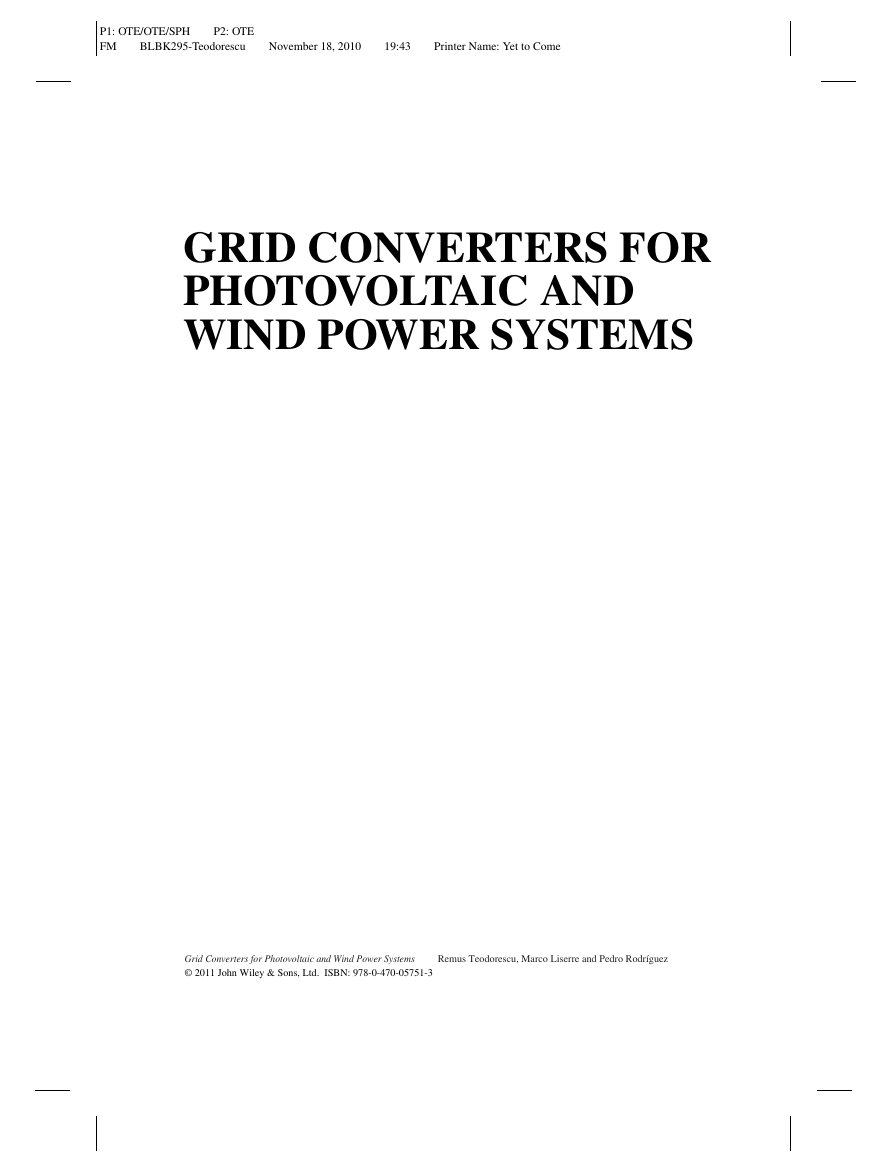
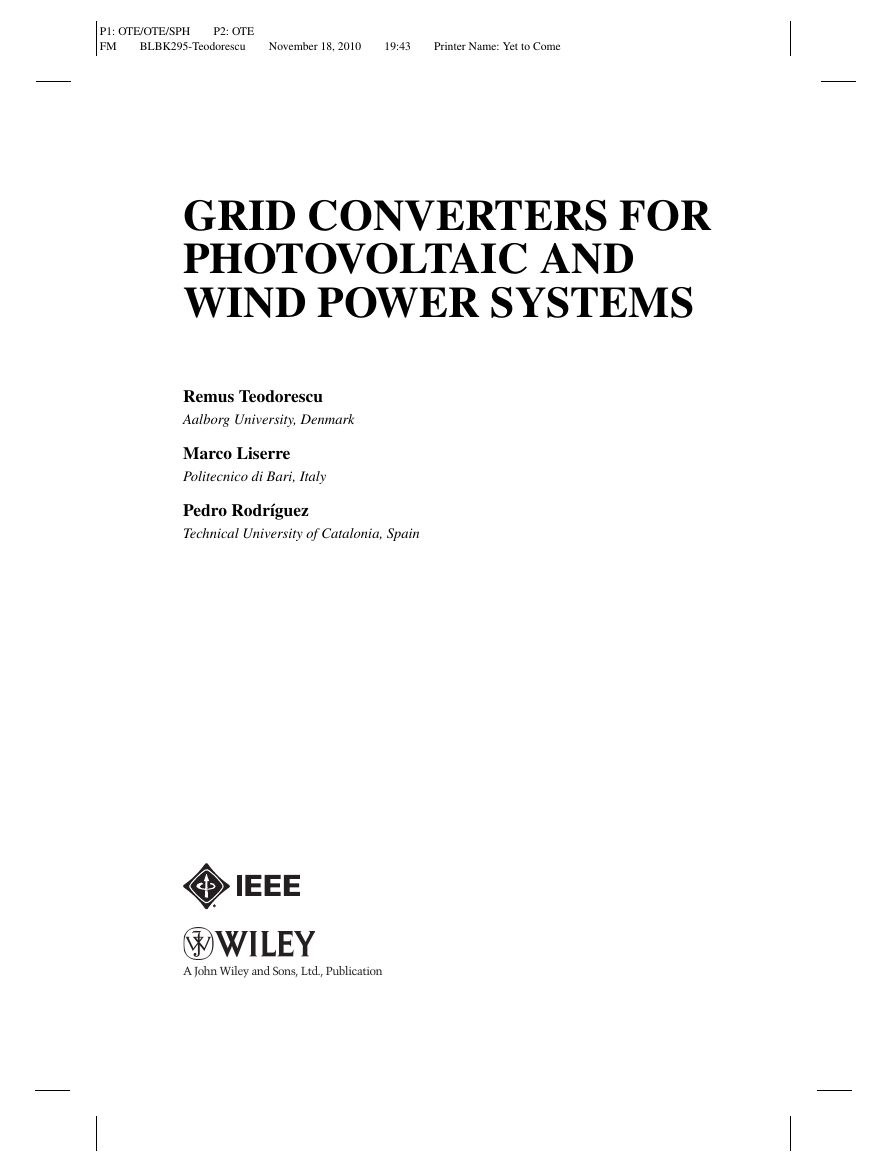

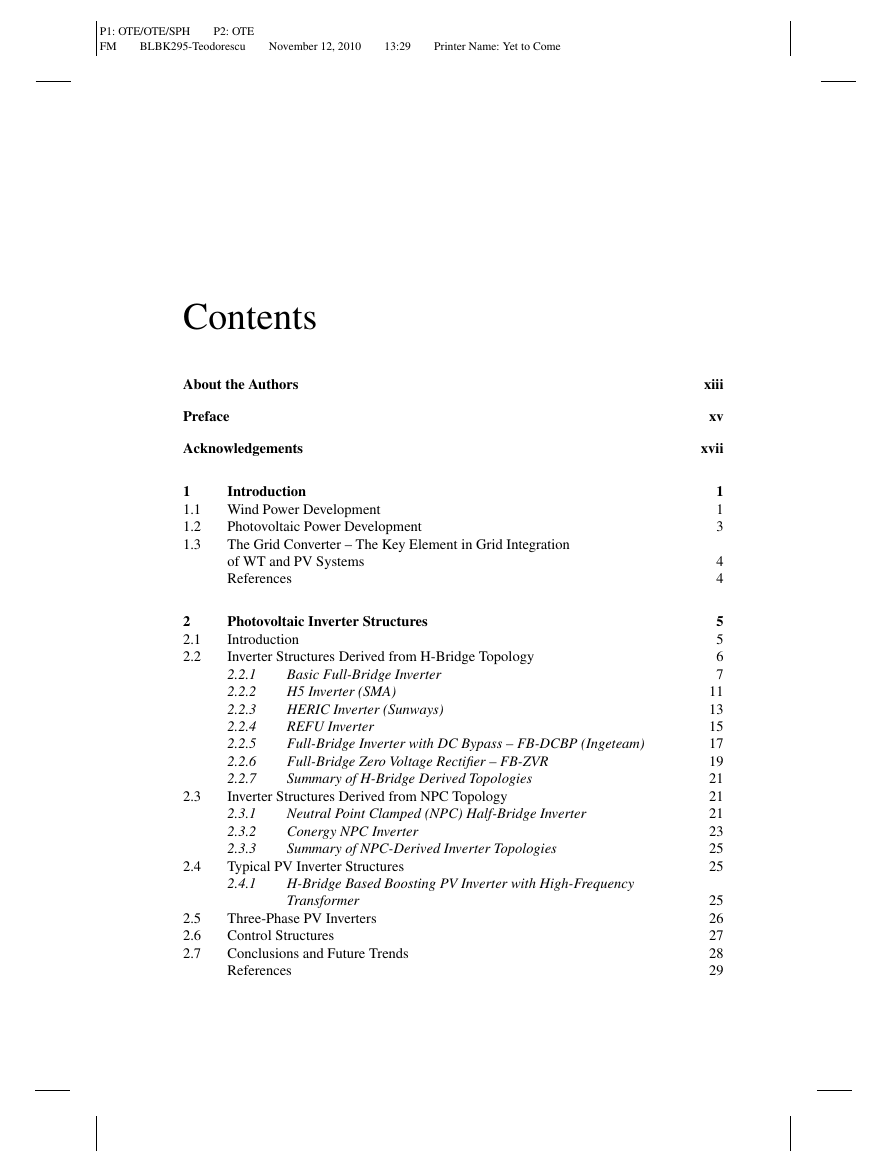
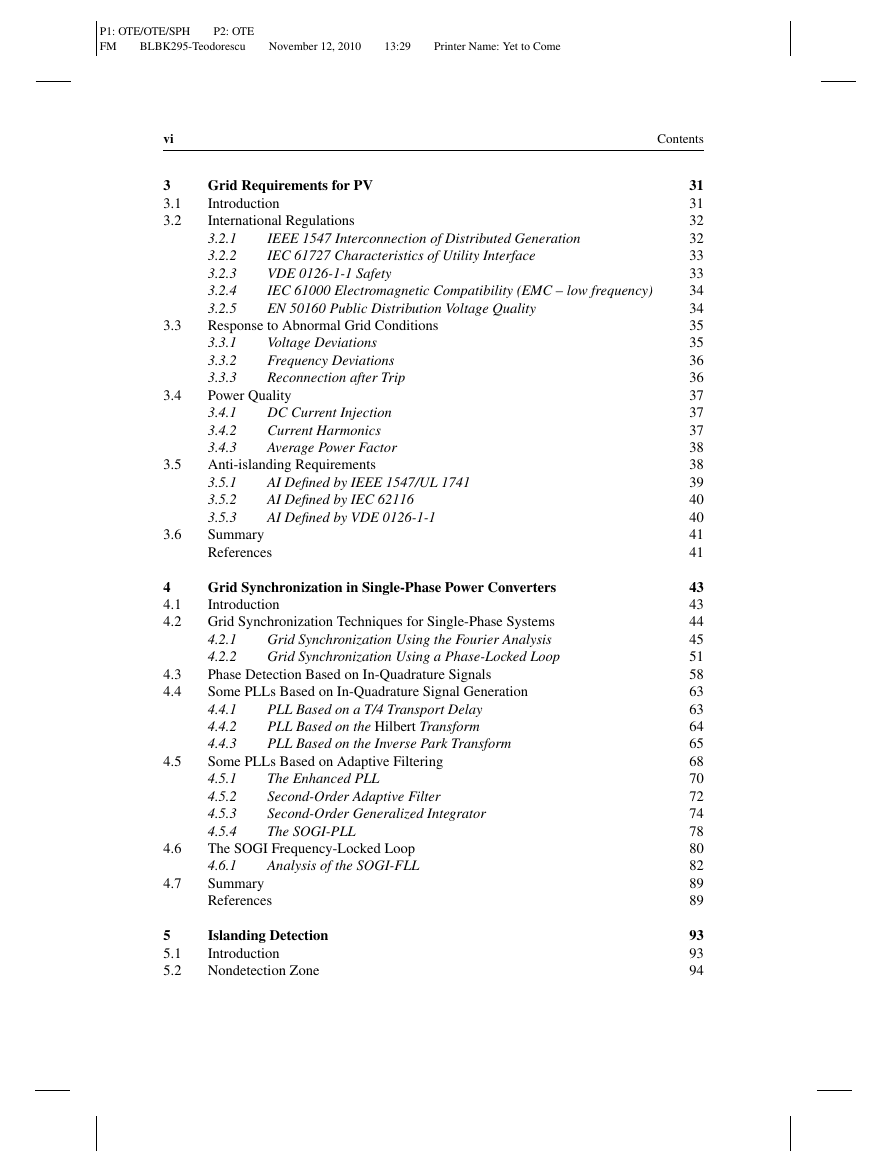
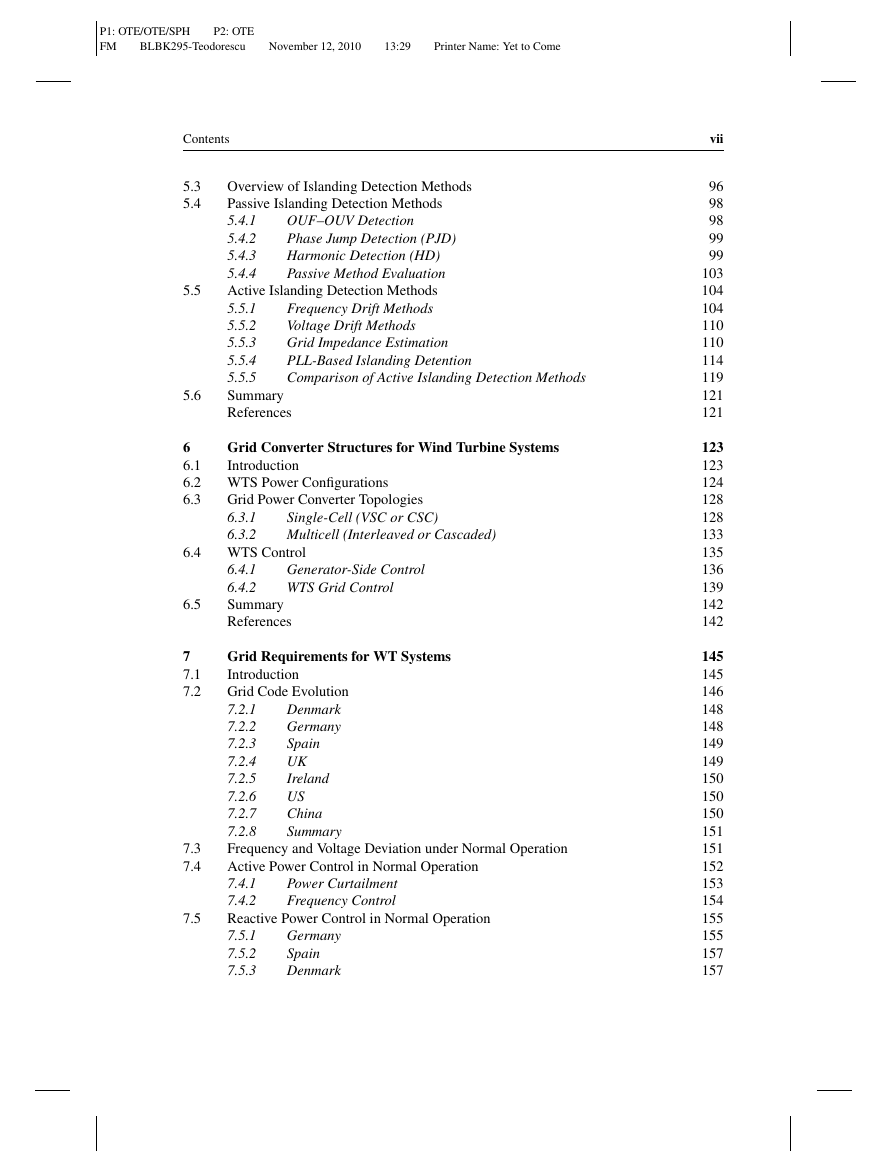
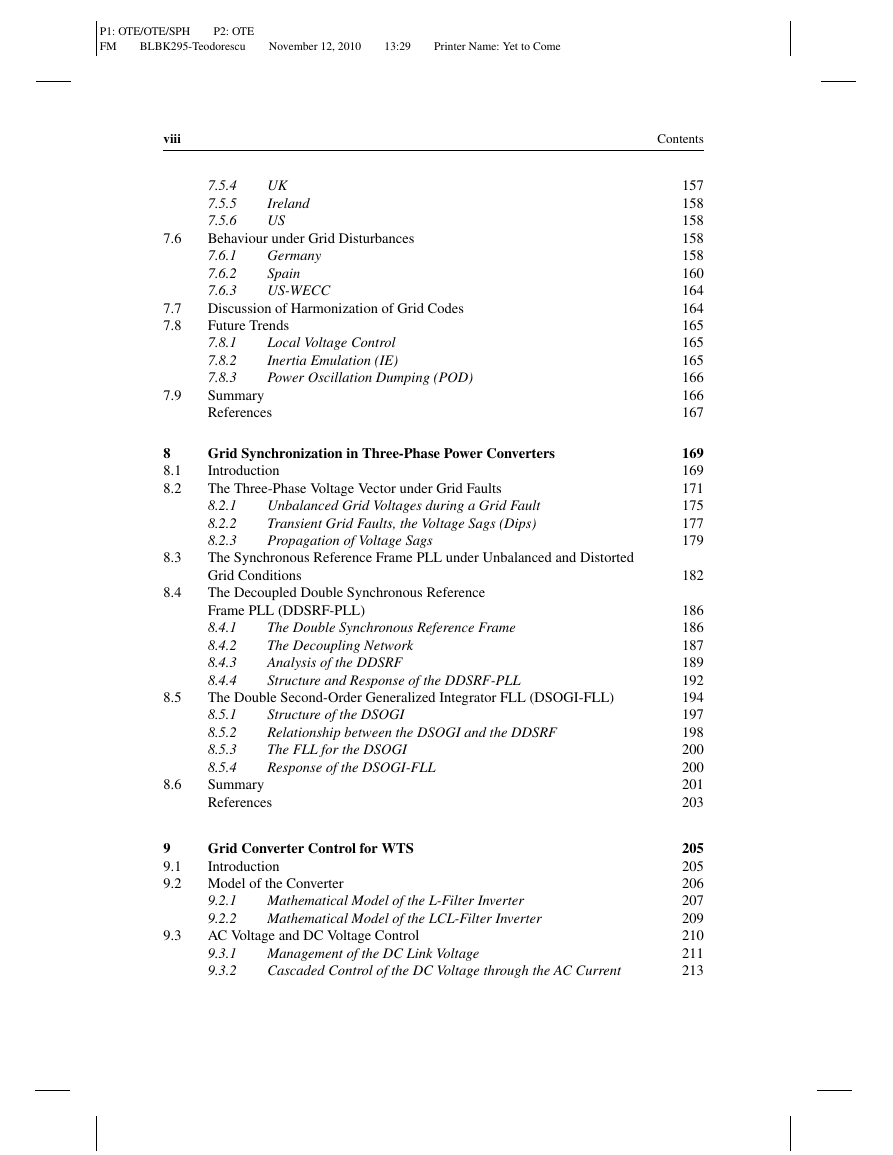
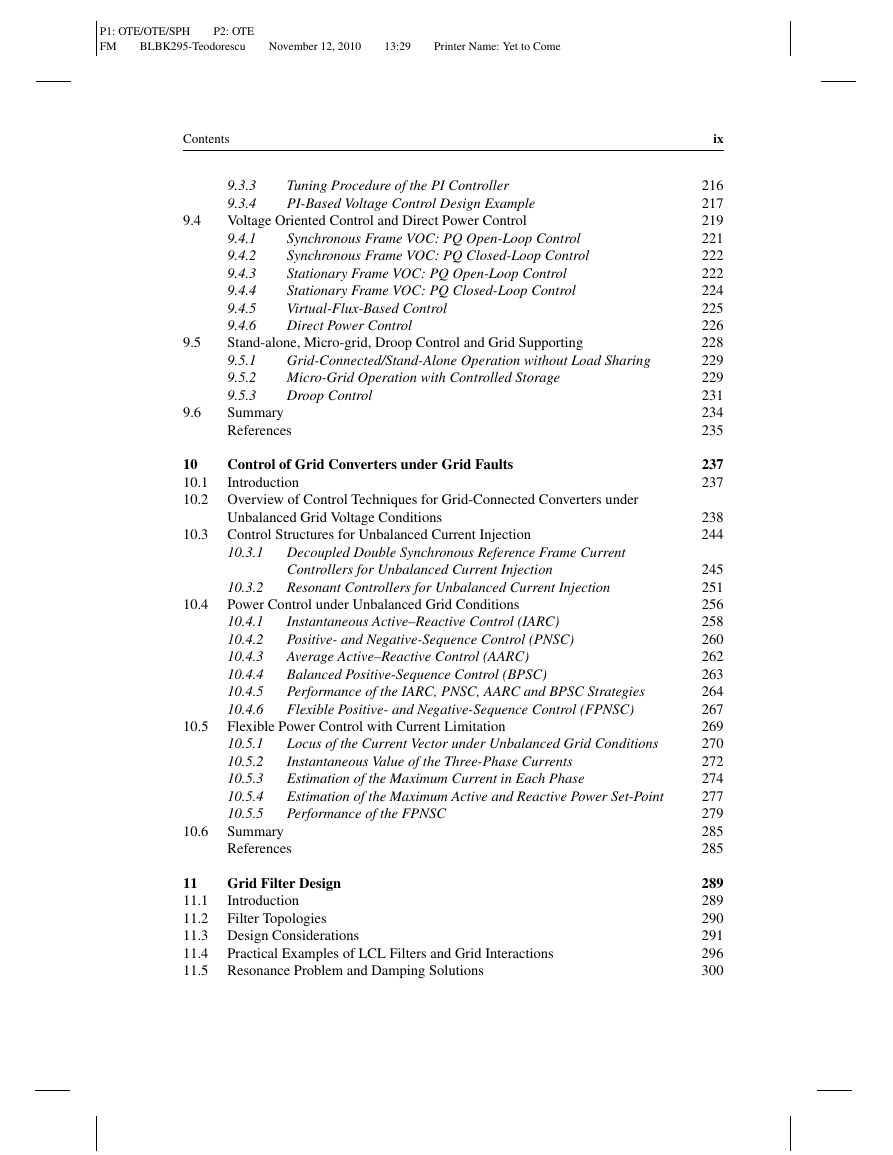








 2023年江西萍乡中考道德与法治真题及答案.doc
2023年江西萍乡中考道德与法治真题及答案.doc 2012年重庆南川中考生物真题及答案.doc
2012年重庆南川中考生物真题及答案.doc 2013年江西师范大学地理学综合及文艺理论基础考研真题.doc
2013年江西师范大学地理学综合及文艺理论基础考研真题.doc 2020年四川甘孜小升初语文真题及答案I卷.doc
2020年四川甘孜小升初语文真题及答案I卷.doc 2020年注册岩土工程师专业基础考试真题及答案.doc
2020年注册岩土工程师专业基础考试真题及答案.doc 2023-2024学年福建省厦门市九年级上学期数学月考试题及答案.doc
2023-2024学年福建省厦门市九年级上学期数学月考试题及答案.doc 2021-2022学年辽宁省沈阳市大东区九年级上学期语文期末试题及答案.doc
2021-2022学年辽宁省沈阳市大东区九年级上学期语文期末试题及答案.doc 2022-2023学年北京东城区初三第一学期物理期末试卷及答案.doc
2022-2023学年北京东城区初三第一学期物理期末试卷及答案.doc 2018上半年江西教师资格初中地理学科知识与教学能力真题及答案.doc
2018上半年江西教师资格初中地理学科知识与教学能力真题及答案.doc 2012年河北国家公务员申论考试真题及答案-省级.doc
2012年河北国家公务员申论考试真题及答案-省级.doc 2020-2021学年江苏省扬州市江都区邵樊片九年级上学期数学第一次质量检测试题及答案.doc
2020-2021学年江苏省扬州市江都区邵樊片九年级上学期数学第一次质量检测试题及答案.doc 2022下半年黑龙江教师资格证中学综合素质真题及答案.doc
2022下半年黑龙江教师资格证中学综合素质真题及答案.doc